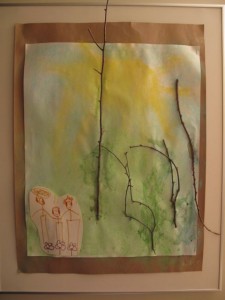Posts Tagged ‘BCTF’
Who Will Fight For Public Education?
On December 6, Peter Fassbender, the provincial Minister of Education, spoke at the BC School Trustees Association (BCSTA) Academy. It was the first time I had heard him in-person and I found his presentation to be coercive, if not threatening. His central argument seemed to be that in these uncertain economic times Boards of Education must make hard decisions or else face the consequences. I’m still trying to decipher his meaning.
Afterwards, in one of those characteristic quick chats you have at events such as these, another Trustee said to me she felt Minister Fassbender sounded more like the Minister for Small Business and Trade than the Minister of Education. Then she said this: “If you can’t count on the Minister of Education, then who can you count on? Who will fight for public education?”
Why?
Because although there are many passionate advocates who fight for the public education system, decision-making power rests at the table in front of cabinet Ministers and the Premier. And while they may believe in the importance of education, they seem to disavow any notion that the public education system is underfunded or that we have reached a point where school districts are unable to cover additional costs without directly affecting programs and services.
With that in mind, here’s the speech I wish the Minister had delivered to the assembly after Teresa Rezansoff, the President of BCSTA, had welcomed him to the podium and after he had acknowledged our presence on traditional territories.
“Good afternoon and thank you for inviting me to share my thoughts with you today.
When Rod Allen makes his presentation on changes to the BC curriculum, he may tell you that many young people lose their first job because they aren’t able to collaborate well with others. You also know that when we talk about 21st century learning we often focus on collaboration as one of the key skills we want our young people to develop. And you know, as well as I do, that we need to model the skills we want to teach. So, as Minister of Education, I plan to do just that. Over the next four years, I’ll do my very best to ensure that the governance of the public education system in BC is pursued on a collaborative basis.
That’s why I want to start off by thanking you. I want to thank each and every Board for funding the recent wage settlement with support staff. Not only is it incumbent upon us to recognize their hard work with gratitude, it’s important to be able to compensate their efforts with fair wage increases. But I know it was tough to make the necessary adjustments to your budgets and your operational plans and I’m sorry that we weren’t able to provide you with additional resources to cover this cost item. That’s why I want you to know that the next settlement, the one we hope to arrive at with the BCTF in this round of bargaining, will be fully funded. It will be fully funded because I know it would be unreasonable to expect the costs to come out of your budgets as they are currently structured.
With regard to the BCTF, let me say how pleased I am at the tenor of dialogue we’ve been able to establish with Jim Iker and his team at the BCTF since my appointment as Minister of Education. Our relationship is off to a good start and I look forward to continuing to build on that strength. But bargaining is tough. It’s not easy. But let me assure you that while our goal in bargaining is to secure a long-term contract, we also are focused on providing a fair deal. We want a long-term solution to ensure labour peace for students and their families, and to allow the amazing educators we have in this province to focus on the new curriculum, the changes in graduation requirements we hope to introduce, and the new approaches to assessment which will enhance student learning. In other words, we want to make sure that the energies of our educators are directed to the work that they do and not the need to fight with us. That’s collaboration. The end result may be a 10-year deal; it may be something else. We won’t let go of our desire for a long-term solution, but we want our partners to know that our public commitment to a particular time frame will not trump our willingness to bargain in good faith and to secure a fair settlement.
Allow me to make another quick note about bargaining. We will be bringing down legislation in February which will detail a new bargaining structure for the public education sector. The input you’ve provided with regard to what that may look like is very much appreciated. And let me say this: whatever that new structure will look like, it will not, in anyway, compromise the role and status of locally elected school boards. Having locally elected school boards means that local issues can be dealt with in a way that is sensitive to the needs and the wants of each individual community. That makes all the difference to the way public education is delivered at the local level and that’s a point that I’ll be stressing during the core review process as well.
As you know, my cabinet colleague Bill Bennett is in charge of the core review and he is also the Minister of Energy and Mines. Bill has said publicly that there will be no consideration for school districts when it comes to the recently announced BC Hydro rate increases. I realize that increases of this magnitude have become necessary because of decisions made by previous governments and the way in which the government’s relationship with BC Hydro has been structured. We’re working on that, but I want you to know that I plan to sit down with Bill as soon as possible and to push hard to see if there isn’t something we can do to mitigate the impact on you. I need to do that because I know, as well as you do, that any additional costs to your districts without additional funding means an impact on programs and services. And that’s not what we want.
It’s not what we want because even though your resources are stretched to the limit, you’ve done a fine job of making sure our young people are getting the education they need in order to be competitive. You can see that in the OECD PISA results released this week. Isn’t it great how well our young British Columbians are doing compared to other students from around the world? Together, we’ve done a wonderful job and we have to continue to build from this position of strength. We cannot afford to be complacent; we cannot afford to neglect the system that has served us well and which is essential to the continued success of our young men and women.
And that’s why I want you to know that I am sensitive to your challenges. I have read your letters, I have listened to you, and I have heard you. Funding is one of the key challenges facing our public education system because even though we may be spending more than ever before, costs have outpaced the level of funding provided. That won’t do. That’s just not good enough.
That’s why I want you to know that at the cabinet table I am demanding more for education. Yes, I know times are uncertain. Yes, I know the budget is stretched. But I will make it clear to the Premier that if we continue to demand the best from our public education system, we must ensure that the public education system has the means by which to be the best.
Because, like you, I believe that a strong, vibrant public education system is integral to our democratic society. We need jobs, we need a robust economy, but we also need to make sure our society is well-educated so we can maximize the potential of those jobs and that economy for all British Columbians.
Who will fight for public education? I will and you will and this government will because education is a priority — for you, for me, for the children, for all of us, and for the future.
Thank you.”
The Impossibility of Knowing What Is To Be
Here’s the thing: none of us has a crystal ball. Not the pundits nor the prognosticators, some of whom have made very lucrative careers out of saying what they “know” will happen.
In fact, some say the events which shape the human experience are not the outcomes we forecast, but the unexpected occurrences to which we respond. For more on this, read The Black Swan: The Impact of the Highly Improbable by Nassim Nicholas Taleb.
I know I can’t speak to the future with certainty, but as I look towards the fall, I suspect my voice will be a dissenting one.
Why?
Because events are moving quickly in the public education sector with no clear indication of the government’s ultimate objective and yet there seems to be a general complacency about it all.
Here are three red-flag issues for me:
- The removal of the BCPSEA Board points to a profound change in the way bargaining will be conducted in the public education sector. I think BCPSEA paid the price for pursuing a path contrary to the provincial government’s vision. The board’s removal was sudden, swift, and seemingly–and mistakenly in my opinion–unlamented. Whether this is an improvement or not remains to be seen, but I am still looking for assurance that this is not the first step in a series of unilaterally determined shifts which may or may not prove to be publicly beneficial.
- A 10-year labour agreement with the BCTF is seductive and such an easy sell in the court of public opinion. But I’m not convinced, unless the deal is fully funded and increases resources significantly for students, that it can be accomplished in a fair and equitable manner. I am also not convinced that it is in the best interest of the employer as I’ve written about before here.
- Publicly elected school boards make a difference because they represent local interests and are accountable to local communities. The fact that we have a high-performing system today is due in large measure to the way districts (everyone from students to parents to trustees to staff to principals to teachers to support staff) have been able to keep the machine humming despite inadequate funding. Yes, the provincial government spends more per student now than ever before, but add up the costs that have been downloaded without being funded and the increases in expenses which haven’t been covered (including key items such as utility costs, MSP premiums, and carbon offsets) and you’ll see why there’s such a discrepancy. Yes, some boards have run into difficulties, and yes improvements can be made, but the attempt to disregard the government’s role in exacerbating the situation is disingenuous.
So while I may not be able to speak to what the future is bound to bring, I do know that I will continue to speak up and to advocate, even if I’m in the minority, because it doesn’t take a crystal ball to see that a healthy, thriving public education system is the best foundation for all our tomorrows.
A Conversation Starter Or The End of A Conversation?
Ratified. That’s the word which characterizes this weekend for me. It denotes success and a goal accomplished. It indicates progress and sets a marker for the way forward.
The Agreement in Committee, a framework for bargaining which was fashioned in a collaborative effort between BCPSEA* and the BCTF**, was ratified this weekend at two separate meetings: the BCPSEA Annual General Meeting and the BCTF Representative Assembly.
This is a bold step for these two organizations. It sets the stage for positive dialogue before the start of labour negotiations. That doesn’t necessarily mean the discussions will be easier or decisions arrived at without difficulty; it does mean that the parties have opened a door to a respectful process, respectful interaction, and — I hope — results.
Yet this step forward may have been jeopardized given the startling turn of events on Thursday, January 24, 2013.
Why?
On Thursday, the provincial government released a document entitled “A Framework For Long Term Stability In Education” ) which came as a surprise to many of us who have a role to play in the public education system in British Columbia.
Although stakeholder submissions had been made by key partner groups on the issue of bargaining before the December holidays, this framework was much broader and incorporated many more issues than I believe were contemplated in those submissions.
While the goal of “stability” in education is admirable, and the narrative that has been designed to sell this new initiative may sound awfully good, scratch beneath the surface and many troubling issues emerge.
For example, why 10 years? Where is the business case for introducing a level of inflexibility which may take away from the employers’ ability to respond to changing circumstances and uncertain economic conditions? Given rapid changes in technology and the reassessment of education, which seems to be in progress in many parts of the world, proposing such a lengthy time span seems like building your foundation on shifting sands.
Premier Clark and Don McRae, the Minister of Education, have both spoken about the plan and the media, including the full array of social media, have played and replayed, digested and parsed their comments.
I also had the opportunity of hearing Minister McRae speak in-person at the BCPSEA AGM today.
He said, again, that this framework was just the beginning, but I see it as stalling momentum rather than encouraging it.
Rather than asking what the best way to fund the public education system may be, we are now debating the merits of establishing yet another separate fund to deal with specific aspects of program delivery and service provision.
Rather than asking what the best way to set educational policy may be, we are now debating who should sit at the table of the proposed educational council.
Rather than asking how to ensure the best working relationship between the parties who negotiate, we are now trying to guess why the government seems intent on stripping BCPSEA of its core mandate which is to bargain on behalf of the 60 school boards in the province.
This government-proposed framework, says Minister McRae, is a conversation starter.
I see it, unlike the now-ratified Agreement in Committee, as a conversation ender.
*British Columbia Public Schools Employers’ Association (https://www.bcpsea.bc.ca)
**British Columbia Teachers Federation (https://www.bctf.ca)
Is There Another Way ?
I walked around my son’s school yesterday to thank each teacher for their work and to express how sorry I was at the way events are unfolding in public education in British Columbia.
Why?
Because I value teachers and the work they do. Because these teachers, whether early in their careers or with many year’s experience, are caught up, as I am, in forces seemingly beyond our control.
 We are spectators to a drama that is playing out on a stage where provincial representatives, whether union or government, cannot find a way to talk to each other. In the absence of dialogue, labeling and name-calling have become the norm. In the absence of a willingness to work towards compromise, brinksmanship has become the norm whether by using the media, social media, or the mechanisms of legislation.
We are spectators to a drama that is playing out on a stage where provincial representatives, whether union or government, cannot find a way to talk to each other. In the absence of dialogue, labeling and name-calling have become the norm. In the absence of a willingness to work towards compromise, brinksmanship has become the norm whether by using the media, social media, or the mechanisms of legislation.
And as much as it is being said that teachers are not shown respect, I feel respect is not being shown towards others in the educational community such as administrators, Trustees, or parents. This disrespect has pervaded the discourse and was on display during George Abbott’s recent Twitter chat. Whatever you may think of the man, his role, and the government he represents, were the derogatory personalized attacks warranted? If you call him a bully or see him as one, is the appropriate response to bully him?
So if our system is dysfunctional, which only serves to harm the interests of those it’s purporting to serve, is there another way forward?
During a recent liaison meeting with administrators, we watched a TEDTalk by Seth Godin in which he talks about starting movements to bring about change.
I’m not sure how and I’m not sure when and I may not be the person to do it, but I would like to start a movement for change in the BC public education system.
To start, I would like to call for a Royal Commission on Education. There hasn’t been one held in BC since 1987, the results of which were captured in a 1988 report entitled A Legacy for Learners.
While expensive and time-consuming, I believe that this high-level, independent, wide-ranging forum is the only way we can capture the big picture of education, its purpose, its link to society, and the way in which its objectives can be fulfilled in the best interest of the students.
I would also suggest, as our understanding has grown over the last 25 years, that a more holistic approach be taken. To truly effect societal change we need to consider education as only one component in a child’s life which links to health and socio-economic well-being among other factors. This would be one way to capture information from other Ministries which may lead to conclusions and recommendations that are transformative in the way we structure programs and services which most affect children and families in this province.
After all, it’s all about the children, isn’t it?


